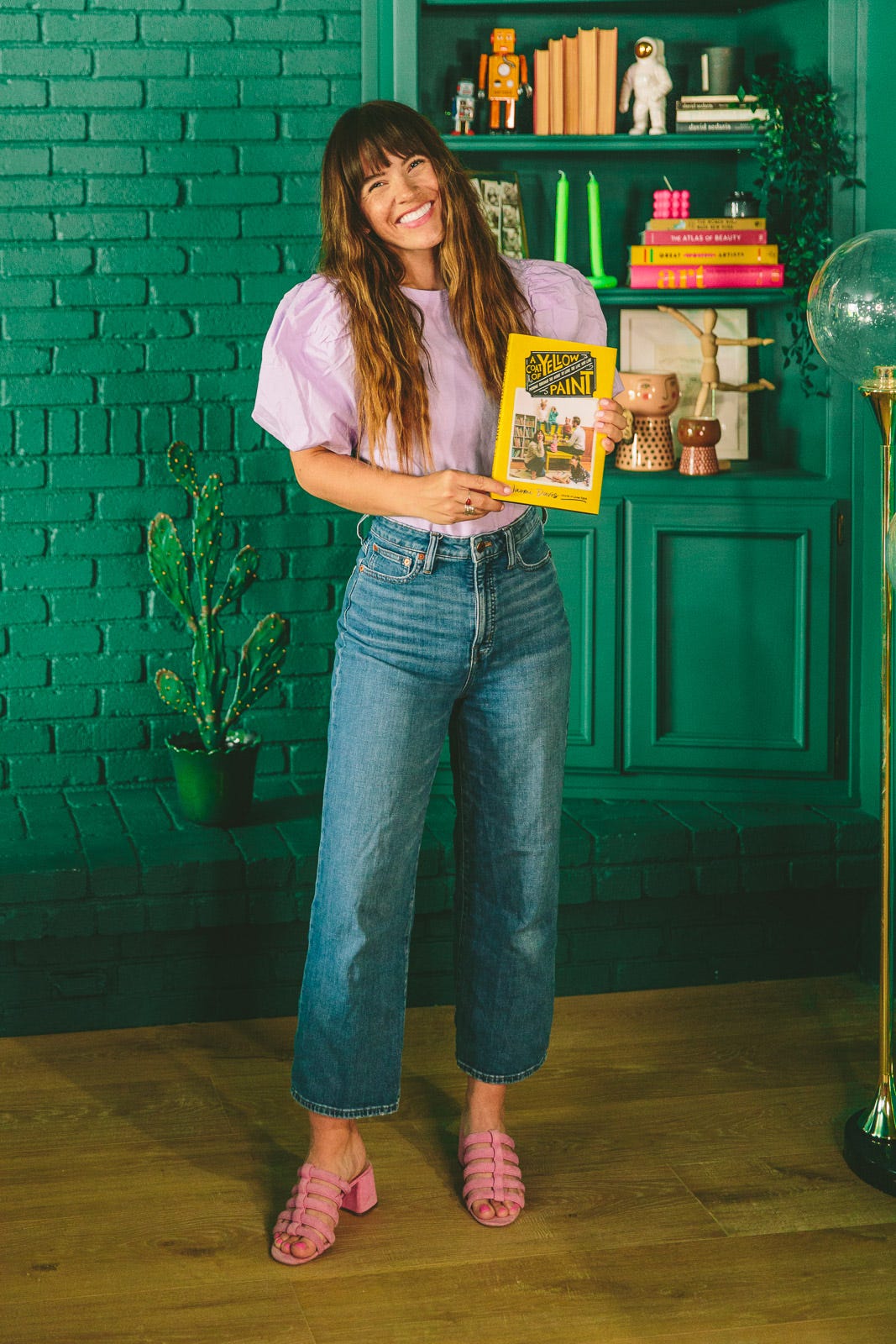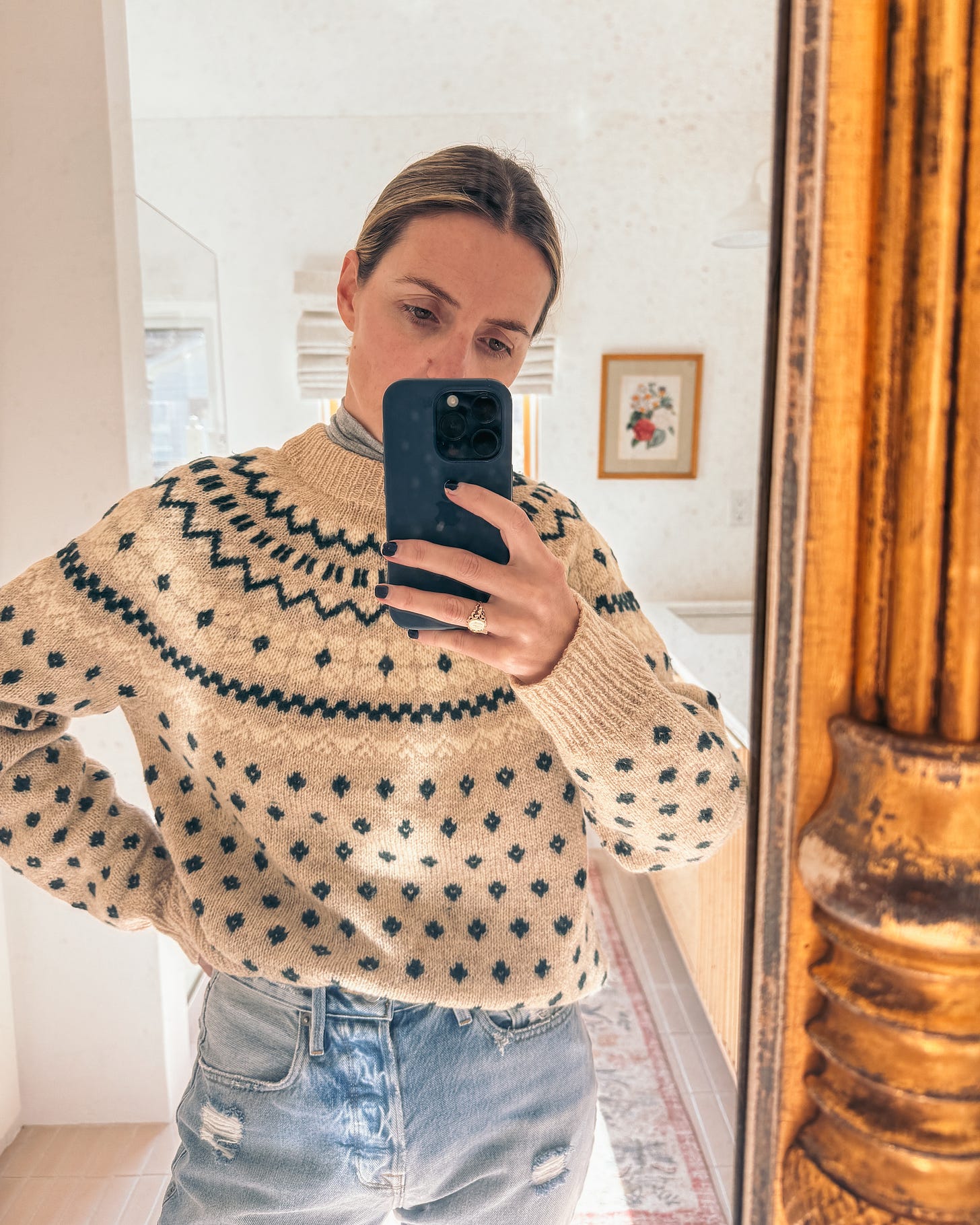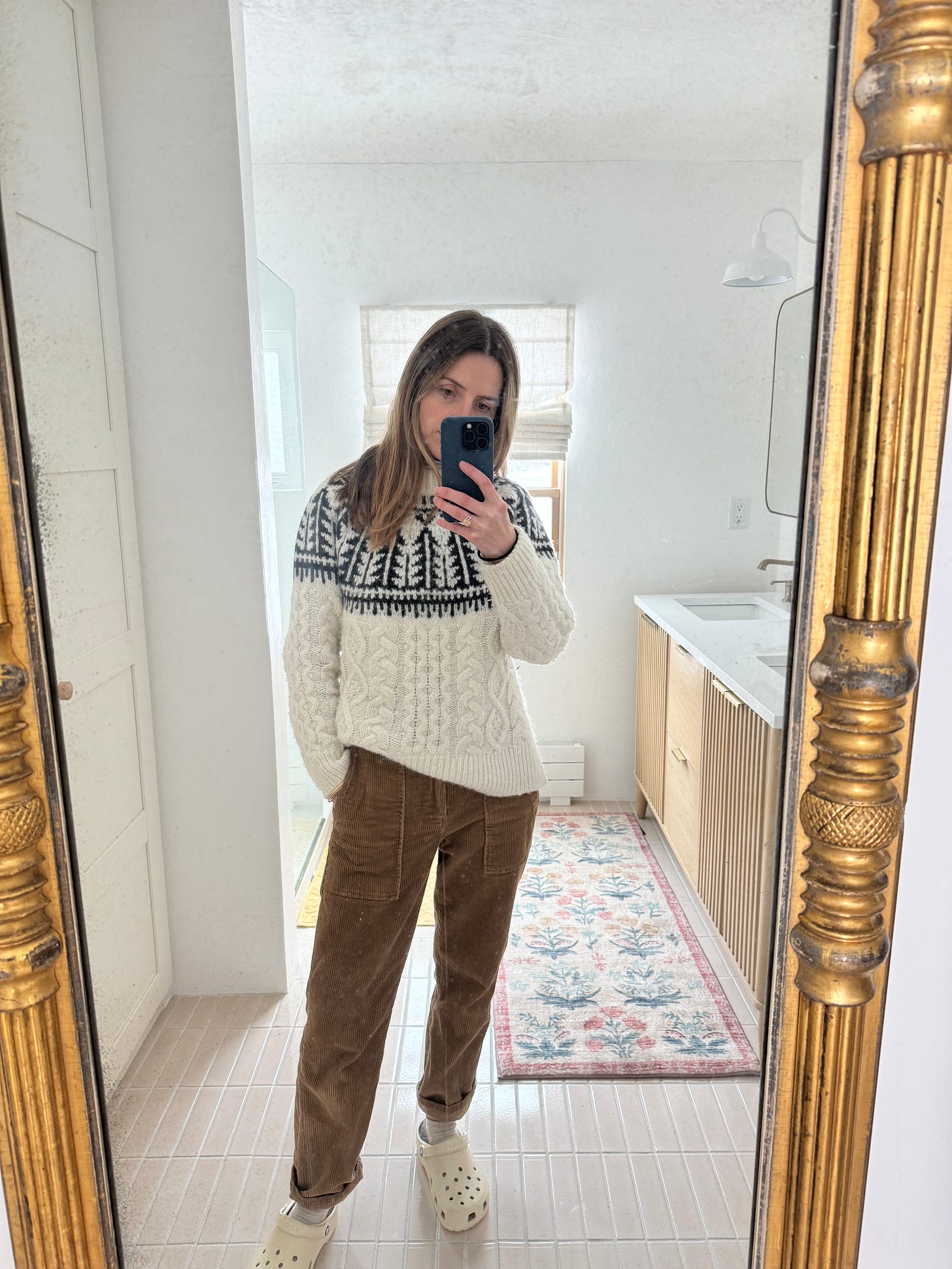The Ex-Influencer Who Refused To Momfluence
Jess Kirby on what she loved (and what she hated) about living life online
The momfluencer I most wanted to interview for Momfluenced was Naomi Davis. Not only because she blew up (in a not so great way) when she fled NYC during a precarious time during the pandemic, but because she was my gateway momfluencer.
Davis was the online mother who spoke loudest to my insecurities about maternal joy, fun, adventure, and ease. She lived in my head rent-free throughout my early motherhood and always had an answer to my doubts about whether or not motherhood could be more vibrant, natural, and fulfilling. And that answer (which I inserted into her mouth through parasocial sorcery) was always, “Yes. If I can do it, so can you.”
Davis’s presence on my screen served as a constant refrain that maybe (if I bought X and did Y), I could be better, feel better, and do better as a mother.
Despite best efforts (guys I TRIED), I never did get to talk to Naomi Davis for the book. I never got to ask her what it was like to live rent free in my head, and in so many other heads. When her memoir, A Coat Of Yellow Paint, came out, I, like many Taza fans, hoped we’d get some sort of insight into what being a momfluencer was really like (we didn’t). Psychologically, practically, financially, personally. Because it’s a wild profession. Momfluencing insists you cherry pick the most marketable, aesthetically pleasing sides of your maternity and offer them up to the masses. Every single influencer I spoke to for Momfluenced said the blurring of lines between professional performer of motherhood and private person engaged in mothering was a psychic battlefield.
All of this is to say that I’m so delighted to talk to , who is maybe the perfect person to walk us all through the many impossible questions attending professional influencing because she’s thought so deeply about these questions herself.
In her newsletter,
, Jess utilizes her background as an influencer to delve into politics, consumerism, personal style, and community, and it was immensely satisfying to ask Jess all the things, and to get real, insightful answers. Receiving such clarifying responses has made me realize that most people have such burning questions about influencers’ lived experiences because we so desperately want to be freed from the cycle of fantasy, projection, and consumption. Jess’s interview does just that.(Please understand it took all of my self-control to not insert a bad Real World joke in the above paragraph. You’re welcome.)
Sara
Can you tell folks a bit about yourself, and how your past work intersects with the mamasphere?
Jess
I’m currently a writer and marketing professional. I live in Vermont with my partner, daughter, and 3 animals (2 dogs, 1 cat). I recently left behind my career as an influencer, which I did for 10 years. At the height of my influencing career I got pregnant, and then had my daughter, almost 5 years ago now. I made a conscious decision that I did not want to be a “momfluencer” or incorporate my daughter into my work as an influencer. But that was complicated and messy in the beginning (more so than I anticipated). Motherhood was a huge shift for me (obviously) but I became increasingly uncomfortable with how it was playing out for me online. Having my daughter was sort of the beginning of the end as it relates to my career as an influencer.
Sara
I’d love to know about your early days as an influencer - what sort of conversations were you having with yourself? Was it like, a conscious decision to “become an influencer,” or did it (as I’d imagine) happen more organically over time? Since “influencer” is still a relatively new job title, I’m always so curious about how folks think about their own influencer becoming stories.
Jess
It was truly just a hobby for me in the beginning. I was working a corporate consulting job in NYC that was leaving me feeling so depleted and uninspired. I started taking photos of what I was wearing before work and posting it online and it really evolved from there. It was something fun and different and exciting. I had always wanted to work in fashion but after applying for so many jobs and being completely ghosted I gave up and decided to write a blog instead. Shortly after that my aunt died and we decided to move back to RI. My job allowed me to work from home so I did that for a while and poured all my free time into building a blog and social media following (this was early 2010s). Eventually I quit my job to pursue it as a career full time which was totally insane, but I was young and childless and didn’t have a mortgage.
Sara
I LOVE your essay on performing new motherhood, and can’t imagine how transformative such an essay would be for every exhausted new mother thinking everything they see on social media is (if not the whole truth), true in some sort of essential, “good” way. Can you talk a bit about how you chose to share your motherhood online, and what that experience was like? How did it change throughout the years, and how did your thought processes about both mothering and performative motherhood change?
Jess
The farther I am from my early days of motherhood, the more compassion I have for myself. I was pretty open about the fact that I never thought I wanted to have kids. I had a very difficult pregnancy (hyperemesis) and then a traumatic postpartum (delayed postpartum hemorrhage) and then a month after my daughter was born my grandmother died and literally a day later the world shut down from Covid. So my early days of motherhood were very isolating. Even though I had been transparent about not enjoying my pregnancy and being unsure about having kids, once I had my daughter I still felt this pressure to assure everyone that I was fine and everything was good and I was happy.
And even though I felt like I had no illusions about the difficulties of becoming a mother, it was so much more difficult and fraught than I could have ever anticipated. And so sharing my experiences of motherhood online gave me some of the positive affirmations I wanted. The flipside was, the more you share about mothering online the more criticism and unsolicited advice you receive about every single thing you say or do (one of the worst things I ever did as an influencer was talk about co-sleeping on the internet, OMG, people CAME FOR ME).
And I think almost as a defense mechanism I began to turn my motherhood experience into something that could be “taught” or “performed.” Like how to do sleep training or how to breastfeed with pumping (absolute nightmare), etc. And as desperate as I was to show everyone I had figured it out and everything was fine, the person I was trying to convince the most was myself.
Sara
I’m eternally interested in the intersection of personal style and motherhood. I’ve never thought more consciously about what style means as I do now that I’m a mother. It feels almost urgent for me to declare myself as a certain version of myself through my style choices. Maybe this means showing that I give zero fucks about fashion by showing up to soccer games in a mismatched (read: not cool) sweatsuit. Maybe that means showing up to a school fundraiser with a bold red lip and quirkily shaped pants. Do you think this is common for people? To think more deeply about personal style after motherhood? Why might that be?
Jess
It probably sounds so cliché but motherhood truly is so transformative (mind, body, spirit). I think there’s a lot of, who am I now? What does this mean for the person I was? And also from a practical perspective life is just different once you have a kid, like I’m sorry I’m just not wearing shoes with a heel with a 4-year-old in tow. Also your body is different (at least mine is).
Once I had my daughter I felt this incredibly powerful urge to dress comfortably. I think because so much about life felt uncomfortable, that anything tight or restrictive made me want to scream. And I also felt this need to show my daughter that you can wear whatever you want as long as it makes you feel good (despite trying to make her a sad beige baby as an infant). And of course all she wants to wear is pink and purple and anything with sparkles on it.
Honestly though I also live in Vermont and there is generally a lot less judgment and expectations around what you wear.
Sara
What was the nail in the coffin for you vis a vis your career as an influencer?
Jess
It was kind of a slow burn. In some ways I think subconsciously I knew having a kid was my way out, because I knew the life I was living was not going to play out in a way I felt comfortable with once there was a child involved. The real turning point was when a complete stranger approached my daughter in a park while she was there with her babysitter. She made up a whole story about knowing me and pretending to be my old college roommate and asked for my number to set up a playdate with her son. It was a whole thing, and I absolutely lost it. I deleted any trace of my daughter online. I feel so strongly about protecting her privacy and allowing her to become her own person offline. And naturally wanting to protect her privacy and identity made me want that for myself too.
I just couldn’t reconcile my values and the person I wanted to be with my career as an influencer. I think what the job was 7 years ago is so different from what it is now, and I became so turned off with the excessive consumerism and hyper-consumption of the industry. I knew I couldn’t be a participant anymore.
Sara
What did you genuinely enjoy about being a professional influencer?
Jess
The money. It’s the most money I ever made in my life and probably ever will make? Which is kind of depressing, but also fine. Free clothes, nice trips, my partner and I literally traveled the world for 5 years before having our daughter. I also did find a lot of meaningful connections with people and even though I don’t think Instagram has the ability to “create community.” Instagram creates unrealistic portrayals of people's lives, it promotes comparison and division. It's bad for mental health. It has negative impacts on many users’ body image. I guess what I want to say is that I don't think it is a good replacement for actual face to face interaction with people and is also causing harm by further isolating people. And I don't want to be a part of that.
But another positive was that many of the women who made up my following share a lot of my values, political opinions, etc., and it was pretty cool to see some of them come along with me on the next chapter which was obviously quite different from how they came to know me.
Sara
What are you so happy you don’t feel compelled to do anymore - as an ex-influencer?
Jess
Where do I even begin? I actually wrote about it here, but everything from adhering to beauty standards to constantly taking photos and videos of myself. Documenting every little moment. Probably the biggest thing is not having to sell people shit all the time. I really do not want to convince anyone to buy more stuff. Period.
Sara
What do you think people most misunderstand about professional influencing vs. having a big (unmonetized) online presence? I find myself getting impatient about people resenting influencers having the audacity to want to be paid for their work lol. Like when people respond to an affiliate link or a discount code as “inauthentic” bids for cash.
Jess
I struggle to answer this question, lol. I completely agree that I think influencers should be paid for their work. I also think that the people making the clothes influencers are selling should be paid for their work, but guess what, most of them are not making a living wage. It’s genuinely a really hard question to answer but from a psychological perspective (and I think about this way more often than I should) once something can be monetized doesn’t that change the nature of the recommendation?
Affiliate links incentivize directing people toward certain products or sites, the ones with the best commission. And listen I occasionally use affiliate links on the rare occasions that I share something, mostly second-hand stuff on eBay which is a 2% commission so it’s not paying the bills. But I guess my point is, once you are getting paid by a brand to talk about them or their products, you’re naturally going to think (and therefore speak) differently about them. Once a bunch of people start clicking on that sweater you linked that’s making you $50 per sale, you’re going to keep sharing and linking to it.
I guess I just don’t see how you can *truly* be 100% honest about a brand or product once you’ve been paid to talk about it and share it with people. Naturally you’re just not going to be as probing or critical. You’re going to feel differently about a $500 sweater if you paid for it with your own money versus if you got it for free (and potentially also got paid to talk about it). It’s just human nature. I’m not sure if that answers your question. 🫠
Sara
No I love how you identified the stickiness here! What have you learned about yourself through performing yourself online? This is something I’m always asking myself, because obviously I perform myself online! I feel (perhaps naively) that I’m less vulnerable to psychological mindfuckery since I’m performing Myself As A Writer online, rather than, for example, a selfhood that’s more contingent on the role of aesthetics and images to communicate something about my typology. If that makes sense!
Jess
It’s funny because initially when I read your question I thought “well I’m not performing myself online anymore.” But obviously I am, I guess we all are in some ways? And as an eldest daughter (and former Catholic school kid), I am constantly trying to untangle myself from the need to be the “good girl.”
Interestingly (or not?) I always saw myself, or wanted to be perceived as “relatable,” but when I look back on the content I was putting out it really doesn’t give off those vibes. And why did I want to be seen as relatable? My identity used to be so wrapped up in who I was as an influencer that I truly lost sight of myself. When I decided to walk away, it took a while for me to re-discover my own taste. I kept thinking, do I even like this? Do I actually want to dress this way or did I just wear this for so long because it performed well or people expected this of me?
I talked about this in a recent essay, but I recently made an appointment to get a haircut and didn’t think for a second about how it would impact anything. I kept my hair long for years because it was what people expected of me, and it was “my thing.” And the other day I went to the salon and got a super short bob. And I didn’t need anyone’s opinion on whether or not I should do it, and I didn’t feel the need to share a photo of it afterwards for anyone’s approval. And that felt fucking fantastic.









I love Sara and Jess! Thx for this great read. So much to think about re:motherhood and performance.
I always appreciate the question of how we perform online- I have a lot of rules for myself about how I like to portray myself, but admittedly (because I just use Substack as a creative outlet and I write for free), I don’t think as hard about Substack specifically and am more likely to portray myself in a more “genuine” way than I do on Facebook or Instagram where I know more of the people who follow me. Starting to write more about my husband and our relationship this year was a change for me- writing about being in a politically divided household was hard for me because although I ended up getting over 300 likes on my note, I had some unfortunate responses where people were extremely rude. I didn’t really think that hard about it- I share notes all the time on here and barely anyone sees them or likes them, so it was a new experience for me to navigate that. On Substack I have let myself write more about how I really think more often than usual, and it’s not nearly as curated as my carefully crafted Instagram posts for birthdays/anniversaries.